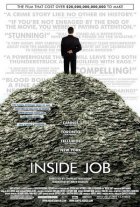
Inside Job Page #3
01:
15:17.28MAN:
Mr. Keating, you got a word?NARRATOR:
In 1985, when federal regulators began investigating him, Keating hiredan economist named Alan Greenspan. In this letter to regulators, Greenspan praised
Keating's sound business plans and expertise; and said he saw no risk in allowing
Keating to invest his customers' money. Keating reportedly paid Greenspan 40,000
dollars.
01:
15:45.01 Charles Keating went to prison shortly afterwards. As for Alan Greenspan,President Reagan appointed him chairman of America's central bank, the Federal
Reserve. Greenspan was reappointed by presidents Clinton and George W. Bush.
01:
16:01.00 During the Clinton administration, deregulation continued under Greenspanand Treasury secretaries Robert Rubin — the former CEO of the investment bank
Goldman Sachs — and Larry Summers, a Harvard economics professor.
01:
16:15.26NOURIEL ROUBINI:
The financial sector, Wall Street being powerful; having lobbies,having lots of money; step by step, uh, captured the political system; you know, both on
the Democratic and the Republican side.
01:
16:28.00NARRATOR:
By the late 1990s, the financial sector had consolidated into a few giganticfirms, each of them so large that their failure could threaten the whole system; and the
Clinton administration helped them grow even larger.
Inside Job transcript – Sony Pictures – September 2010
15
In 1998, Citicorp and Travelers merged, to form Citigroup, the largest financial services
company in the world. The merger violated the Glass-Steagall Act, a law passed after
the Great Depression, which prevented banks with consumer deposits from engaging in
risky investment banking activities.
01:
17:02.00{ROBERT GNAIZDA
FORMER DIRECTOR:
GREENLINING INSTITUTE}
ROBERT GNAIZDA:
It was illegal to acquire Travelers. Greenspan said nothing. TheFederal Reserve gave 'em an exemption for a year; and then they got the law passed.
NARRATOR:
In 1999, at the urging of Summers and Rubin, Congress passed theGramm-Leach-Bliley Act, known to some as the Citigroup Relief Act. It overturned
Glass-Steagall, and cleared the way for future mergers.
01:
17:30.02{ROBERT RUBIN WOULD LATER MAKE $126 MILLION
AS VICE CHAIRMAN OF CITIGROUP.
HE DECLINED TO BE INTERVIEWED FOR THIS FILM.}
01:
17:36.20{WILLEM BUITER
CHIEF ECONOMIST, CITIGROUP}
WILLEM BUITER:
Why do you have big banks? Well, because banks like monopolypower; because banks like lobbying power; because, um, banks know that when they're
too big, they will be bailed.
01:
17:48.10{GEORGE SOROS
CHAIRMAN:
SOROS FUND MANAGEMENT}
GEORGE SOROS:
Markets are inherently unstable, or at least potentially unstable. Anappropriate metaphor is the oil tankers. They are very big; and therefore, you have to
put in compartments to prevent the sloshing around of oil from capsizing the boat. The
design of the boat has to take that into account. And after the, uh, uh, Depression, the
Inside Job transcript – Sony Pictures – September 2010
16
regulations actually introduced these very ti-, watertight compartments. And
deregulation has led to the end of co-, compartmentalization.
01:
18:27.21NARRATOR:
The next crisis came at the end of the '90s. The investment banks fueleda massive bubble in Internet stocks, which was followed by a crash in 2001 that caused
5 trillion dollars in investment losses. The Securities and Exchange Commission, the
federal agency which had been created during the Depression to regulate investment
banking, had done nothing.
01:
18:49.10ELIOT SPITZER:
In the absence of meaningful federal action — and there has beennone — and given the clear failure of self-regulation; it has become necessary for others
to step in and adopt the protections needed.
01:
19:00.24NARRATOR:
Eliot Spitzer's investigation revealed that the investment banks hadpromoted Internet companies they knew would fail. Stock analysts were being paid
based on how much business they brought in. And what they said publicly was quite
different from what they said privately.
NEWSCASTER:
Infospace; given the highest possible rating; dismissed by an analystas a "piece of junk." Excite, also highly rated, called "such a piece of crap."
01:
19:25.14{ELIOT SPITZER
GOVERNOR, NEW YORK STATE (2007-2008)
ATTORNEY GENERAL, NEW YORK STATE (1999-2007)
ELIOT SPITZER:
The defense that was proffered by many of the investment banks wasnot, you're wrong; it was, everybody's doing it, and everybody knows it's going on, and
therefore nobody should rely on these analysts anyway.
NARRATOR:
In December 2002, 10 investment banks settled the case for a total of 1.4billion dollars, and promised to change their ways.
{BEAR STEARNS $80 MILLION
CREDIT SUISSE $200 MILLION
DEUTSCHE BANK $80 MILLION
J.P. MORGAN $80 MILLION
MERRILL LYNCH $200 MILLION
Inside Job transcript – Sony Pictures – September 2010
17
MORGAN STANLEY $125 MILLION
UBS $80 MILLION
GOLDMAN SACHS $110 MILLION
CITIGROUP $110 MILLION}
01:
19:51.09NARRATOR:
Scott Talbott is the chief lobbyist for the Financial Services Roundtable,one of the most powerful groups in Washington, which represents nearly all of the
world's largest financial companies.
CHARLES FERGUSON: Are you comfortable with the fact that several of your member
companies have engaged in large-scale criminal activity?
SCOTT TALBOTT:
I, you'll have to be specific.CHARLES FERGUSON: Okay. Uh –
SCOTT TALBOTT:
And first of all, criminal activity shouldn't be accepted, period.01:
20:14.13 {MUSIC CUE}01:
20:23.26NARRATOR:
Since deregulation began, the world's biggest financial firms have beencaught laundering money, defrauding customers, and cooking their books; again and
again and again.
{JP MORGAN – BRIBED GOVERNMENT OFFICIALS
RIGGS BANK – LAUNDERED MONEY FOR
CHILEAN DICTATOR AUGUSTO PINOCHET
CREDIT SUISSE – LAUNDERED MONEY FOR IRAN
IN VIOLATION OF US SANCTIONS}
01:
20:45.14 Credit Suisse helped funnel money for Iran's nuclear program, and for theAerospace Industries Organization of Iran, which builds ballistic missiles.
MAN:
Any information that would identify it as Iranian would be removed.NARRATOR:
The bank was fined 536 million dollars.Citibank helped funnel 100 million dollars of drug money out of Mexico.
01:
21:05.17Inside Job transcript – Sony Pictures – September 2010
18
WOMAN:
Did you comment, tch-, that she should, quote, lose any documentsconnected with the account?
{NOVEMBER 9, 1999}
{ALBERT MISAN
VP, CITIBANK PRIVATE BANK (NY)}
ALBERT MISAN:
I said that in a kidding manner. It was at the early stages of this. I didnot mean it seriously.
01:
21:18.28{FREDDIE MAC
ACCOUNTING FRAUD – FINED $125 MILLION
FANNIE MAE:
ACCOUNTING FRAUD – FINED $400 MILLION}
NARRATOR:
Between 1998 and 2003, Fannie Mae overstated its earnings by morethan 10 billion dollars.
Translation
Translate and read this script in other languages:
Select another language:
- - Select -
- 简体中文 (Chinese - Simplified)
- 繁體中文 (Chinese - Traditional)
- Español (Spanish)
- Esperanto (Esperanto)
- 日本語 (Japanese)
- Português (Portuguese)
- Deutsch (German)
- العربية (Arabic)
- Français (French)
- Русский (Russian)
- ಕನ್ನಡ (Kannada)
- 한국어 (Korean)
- עברית (Hebrew)
- Gaeilge (Irish)
- Українська (Ukrainian)
- اردو (Urdu)
- Magyar (Hungarian)
- मानक हिन्दी (Hindi)
- Indonesia (Indonesian)
- Italiano (Italian)
- தமிழ் (Tamil)
- Türkçe (Turkish)
- తెలుగు (Telugu)
- ภาษาไทย (Thai)
- Tiếng Việt (Vietnamese)
- Čeština (Czech)
- Polski (Polish)
- Bahasa Indonesia (Indonesian)
- Românește (Romanian)
- Nederlands (Dutch)
- Ελληνικά (Greek)
- Latinum (Latin)
- Svenska (Swedish)
- Dansk (Danish)
- Suomi (Finnish)
- فارسی (Persian)
- ייִדיש (Yiddish)
- հայերեն (Armenian)
- Norsk (Norwegian)
- English (English)
Citation
Use the citation below to add this screenplay to your bibliography:
Style:MLAChicagoAPA
"Inside Job" Scripts.com. STANDS4 LLC, 2025. Web. 22 Feb. 2025. <https://www.scripts.com/script/inside_job_42>.







Discuss this script with the community:
Report Comment
We're doing our best to make sure our content is useful, accurate and safe.
If by any chance you spot an inappropriate comment while navigating through our website please use this form to let us know, and we'll take care of it shortly.
Attachment
You need to be logged in to favorite.
Log In